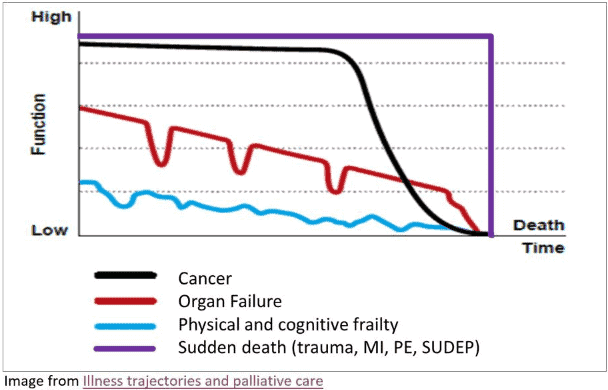Educating families on reporting changes in condition
Published on January 28, 2023
Updated on May 22, 2024
Published on January 28, 2023
Updated on May 22, 2024

Table of Contents
When someone you love is sick and may not get better, you want to do everything possible to make them comfortable and happy. Sometimes, you may notice that they are acting differently or feeling worse. This is called a change of condition. Some changes in condition are severe and need to be reported to the hospice provider right away. Other changes in condition are less urgent and can be written down in a journal until the next nursing visit. This article will help you learn how to tell the difference and what to do.
Some changes in condition are signs that your loved one needs immediate help. These include:
You should call the hospice provider immediately if you notice these changes. They will tell you what to do and may send someone to check on your loved one. They may also give your loved one extra treatment or medicine to make them feel better.
Some changes in condition are not as severe and can wait until the next nursing visit. These include:
If you notice any of these changes, you should write them down in a journal. You can use a notebook, a calendar, or a phone app to keep track of them. You should write down the date, the time, the change of condition, and what you did to help your loved one. For example, you can write: “Nov 18, 9:00 am, mom was restless and picking at her blanket; I hugged her and played her favorite music”. This will help the nurse know how your loved one is doing and what they need.
The hospice team is there to help you and your loved one. They will visit you regularly and check on your loved one’s condition. They will also teach you how to deal with some common problems that may happen, such as anxiety, breathing trouble, pain, nausea, constipation, loose stools, or noisy breathing. They will give you some medicine and equipment to use if needed.
It is essential to talk to the hospice team and tell them how your loved one is doing. They will also tell you what to expect and how to prepare for the future. This will help you feel more calm and in control of the situation.
When your loved one is very sick, you may notice some changes in your condition. Some are serious and must be reported to the hospice provider immediately. Others are less urgent and can be written down in a journal until the next nursing visit. The hospice team will help you and your loved one with these changes and provide you with support and resources. By knowing how to tell when your loved one needs help, you can make them more comfortable and happy.
The Importance of Caregiver Journaling
Pain Assessment in Hospitalized Older Adults With Dementia and Delirium
Pain Assessment in Dementia – International Association for the Study of Pain (IASP)
Pain Assessment in People with Dementia: AJN The American Journal of Nursing
Pain Assessment in Advanced Dementia Scale (PAINAD) – MDCalc
Uncontrolled Pain and Risk for Depression and Behavioral Symptoms in Residents With Dementia
Pain Assessment and Pharmacologic Management
Adult Nonverbal Pain Scale (NVPS) Tool for pain assessment
Assessing pain in patients with cognitive impairment in acute care
Pain Assessment in Advanced Dementia Scale (PAINAD)
Pain Assessment in Non-Communicative Adult Palliative Care Patients
Pain Assessment in People with Dementia
Tools for Assessment of Pain in Nonverbal Older Adults with Dementia: A State-of-the-Science Review
Understanding the physiological effects of unrelieved pain
Untreated Pain, Narcotics Regulation, and Global Health Ideologies
Between Life and Death: A Gospel-Centered Guide to End-of-Life Medical Care
Providing Comfort During the Last Days of Life with Barbara Karnes RN (YouTube Video)
Preparing the patient, family, and caregivers for a “Good Death.”
Velocity of Changes in Condition as an Indicator of Approaching Death (often helpful to answer how soon? or when?)
The Dying Process and the End of Life
Gone from My Sight: The Dying Experience
The Eleventh Hour: A Caring Guideline for the Hours to Minutes Before Death